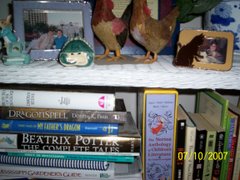As previous posts have indicated, I am a great fan of Sherlock Holmes. I am also a purist when it comes to my favorite characters. I am not a great fan of adding to or taking away from their known history. Therefore, I was very hesitant to read an Enola Holmes mystery. As conceived by Nancy Springer, Enola is the much younger sister of Sherlock and Mycroft Holmes. My curiosity finally won out and I read The Case of The Missing Marquess. I was pleasantly surprised and extremely glad that I did.
The Case of the Missing Marquess: An Enola Holmes Mystery
by Nancy Springer
A 2007 nominee for the Edgar Best Juvenile Mystery
Enola is everything that you would imagine a Holmes family member to be - intelligent, resilient, self-reliant, and quick witted.
The first few chapters are a little slow moving but necessary to prepare the reader to accept and understand why a younger sister of the famous brothers could be unknown to their admiring public. But when the action eventually begins, it begins with a bang and never lags until it reaches a satisfying conclusion.
On her fourteenth birthday, Enola Holmes’ mother mysteriously disappears. Enola has for all intents and purposes been left to take care of herself on the Holmes' country estate, Ferndell Hall. She has had no contact with her brothers since their father’s death ten years earlier. But her telegram to them telling of their missing mother brings them back into her life. They arrive to find things very different from what they expected. The estate is neglected. There are only two servants. As Enola tells her horrified Victorian siblings, she had educated herself by reading “every book in Ferndell Hall’s library, from A Child’s Garden of Verses to the entire Encyclopedia Britannica” including Shakespeare, Aristotle, Locke, and the essays of Mary Wollstonecraft. This was definitely not the proper education for a young lady of those times.
Mycroft and Sherlock reached the conclusion that their mother had embezzled all the funds they had been sending for the upkeep of Ferndell Hall and the care of Enola and had run away to live a life of freedom few women at that time could have. They decided to transform Enola into a proper Victorian young lady. She was to be dressed appropriately (corseted) and sent to boarding school. However, Enola had other plans. Her name, as her mother had often reminded her, spelled backwards reads alone and that Enola was capable of caring for herself - alone. Which she did, ingeniously escaping her brothers’ clutches to begin her own search for their mother.
Ciphers have been very popular in young adult books in recent years - Chasing Vermeer and The Mysterious Benedict Society are two that come to mind. For Enola’s birthday, her mother left her a gift that made no sense to Enola - drawing materials, a hand made book entitled the Meaning of Flowers, and a book on ciphers. Enola would cleverly learn that this was her mother’s cipher - clues to a means that would allow Enola to continue her independent lifestyle. Enola eventually arrived in London where after rescuing a missing young lord she decided on a course that would completely change her life.
I knew things Sherlock Holmes failed even to imagine. . . . In fact, while Sherlock Holmes dismissed 'the fair sex' as irrational and insignificant, I knew of matters his 'logical' mind could never grasp. I knew an entire world of communications belonging to women, secret codes of hat brims and rebellion, handkerchiefs and subterfuge, feather fans and covert defiance, sealing-wax and messages in the positioning of a postage-stamp, calling cards and a cloak of ladylike conspiracy in which I could wrap myself. I expected that without much difficulty I could incorporate weaponry as well as defense and supplies into a corset. I could go places and accomplish things Sherlock Holmes could never understand or imagine, much less do.
And I planned to.
I enjoy well researched mysteries. They allow me to be an arm chair traveler not only of beautiful geographical locals like national parks and the architectural wonders of distant cities but also of fascinating time periods both past and future. This is a well researched mystery. Springer took me into the dark areas of late nineteenth century London in a most realistic way. Young readers should be aware that this is a London of danger and cruelty and horrors.
In my book . . . Enola is a worthy Holmes, a worthy early warrior in the battle for the recognition of women as beings capable of intelligent thought and decisions, and a worthy sister to be adopted by Nancy Drew. I eagerly look forward to more of her adventures. Let the games begin!






